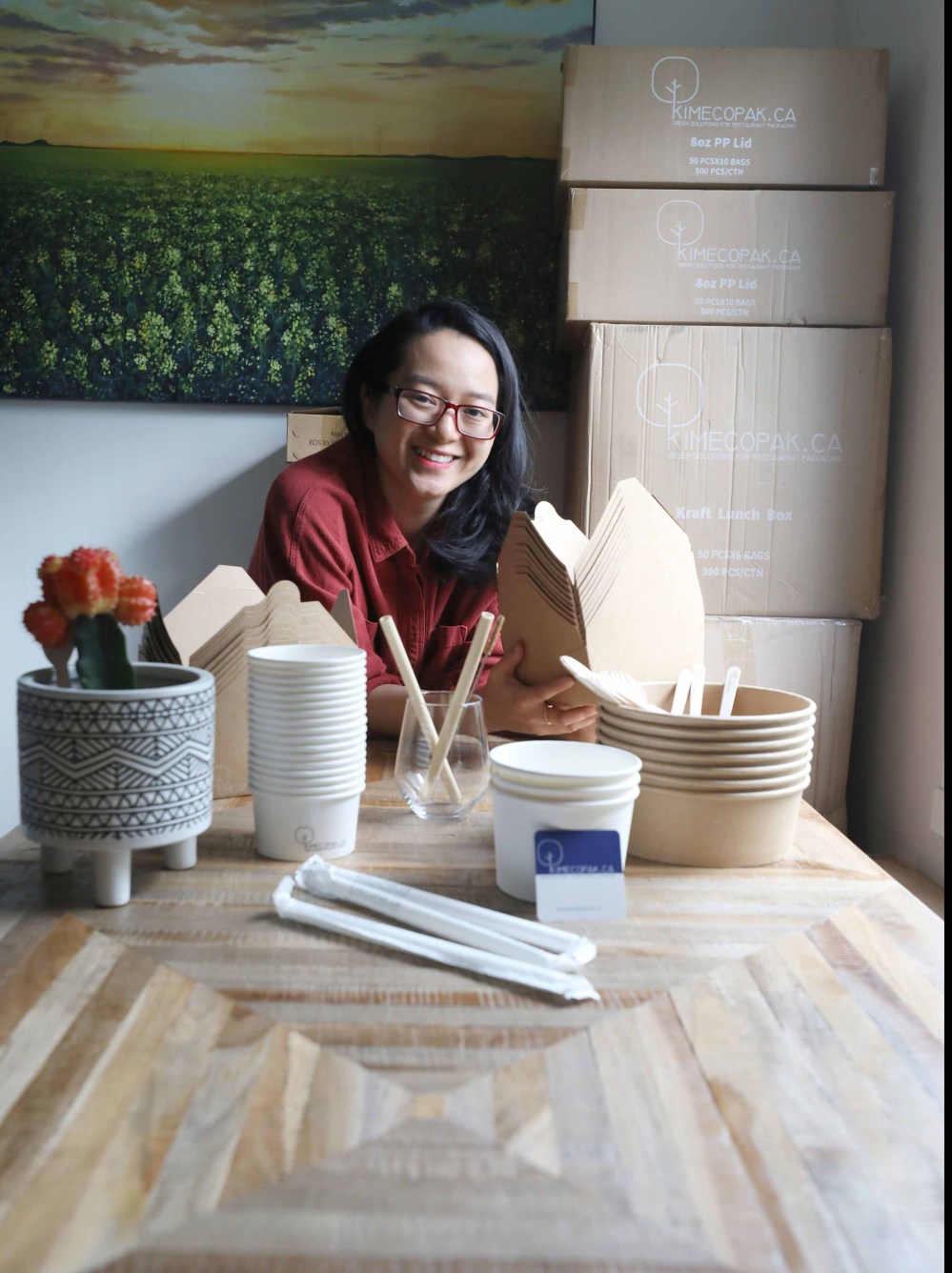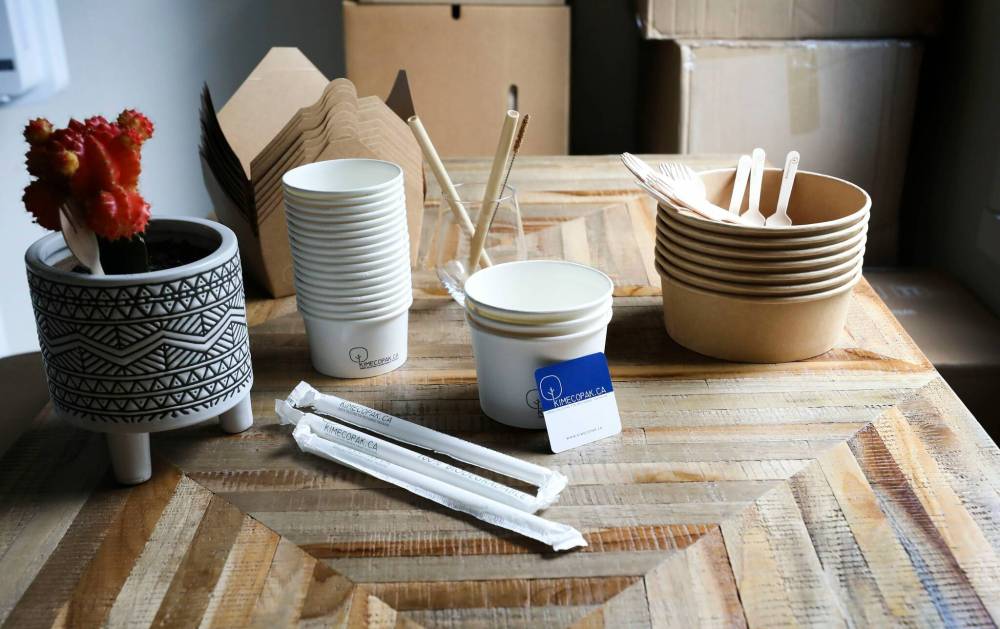Papering over the plastics Newcomer’s business aims to replace single-use Styrofoam packaging with plant-based takeout containers
Read this article for free:
or
Already have an account? Log in here »
To continue reading, please subscribe:
Monthly Digital Subscription
$0 for the first 4 weeks*
- Enjoy unlimited reading on winnipegfreepress.com
- Read the E-Edition, our digital replica newspaper
- Access News Break, our award-winning app
- Play interactive puzzles
*No charge for 4 weeks then price increases to the regular rate of $19.00 plus GST every four weeks. Offer available to new and qualified returning subscribers only. Cancel any time.
Monthly Digital Subscription
$4.75/week*
- Enjoy unlimited reading on winnipegfreepress.com
- Read the E-Edition, our digital replica newspaper
- Access News Break, our award-winning app
- Play interactive puzzles
*Billed as $19 plus GST every four weeks. Cancel any time.
To continue reading, please subscribe:
Add Free Press access to your Brandon Sun subscription for only an additional
$1 for the first 4 weeks*
*Your next subscription payment will increase by $1.00 and you will be charged $16.99 plus GST for four weeks. After four weeks, your payment will increase to $23.99 plus GST every four weeks.
Read unlimited articles for free today:
or
Already have an account? Log in here »
Hey there, time traveller!
This article was published 26/07/2022 (1231 days ago), so information in it may no longer be current.
A young Kim Vu shuffled home from the market in Vietnam, carrying rice in a banana leaf.
Banana leaf wrappers aren’t common in Winnipeg — an older Vu, a new Canadian immigrant, knew that.
Still, the Vietnamese entrepreneur said she was shocked upon arriving in 2020 and finding local restaurants distributing single-use containers.
“They’re still using the plastic and the Styrofoam box — why?” Vu said. “There’s so many plastic cups outside, so many plastic straws.”
RUTH BONNEVILLE / WINNIPEG FREE PRESS Kim Vu, owner of KimEcopak and former co-owner of Yen Kitchen Kim, is selling environmentally friendly take-out containers, spoons and straws that she hopes to eventually start manufacturing in Winnipeg.
So, she’s launched KimEcopak, a business selling plant-based takeout containers and wares.
It comes amid an Ottawa-mandated phase out of single-use plastic items.
Vu began KimEcopak earlier last year, after her own experience searching for greener packaging.
“We were (a) small business, so we were trying (to) save money,” Vu said.
She co-owned Yen Kitchen, a St. James Vietnamese eatery that shuttered earlier this month. It began in May of 2020.
She wanted to be a game-changer among Vietnamese restaurants by using paper takeout materials, something she says she wasn’t seeing.
“The Vietnamese culture is not only about the food. The Vietnamese culture is about nature,” Vu said.
However, suppliers don’t show their prices online. Vu would phone several vendors, make lists and cost compare, she said.
“I don’t need (restaurants) to buy it from KimEcopak, but I just want them to change their minds.” – Kim Vu
“Every second in our minds, it’s… how am I going to get money to pay for the rent, to pay for salaries,” she said. “You try to cut costs as best you can.”
Using paper and wooden products is pricier than the plastic and Styrofoam alternatives. A crate of paper soup containers could double the cost of plastic ones, Vu said.
Vu’s business partner, Yen Phan, watched Vu stoop over her lists comparing packaging costs (which made up roughly 15 per cent of the inventory budget).
Phan recommended Vu order from Asia, where the goods are cheaper. Phan also said they’d ask their friends to buy from Vu, should she make the prices public.
Vu accepted. By April of 2021, she was shipping paper soup containers and salad bowls overseas.
“I don’t need (restaurants) to buy it from KimEcopak, but I just want them to change their minds,” Vu said, adding she wants an end to single-use takeout items.
“This pretty much adds to the list of things that are costing more for restaurants.” – Shaun Jeffrey
Yen Kitchen closed due to pandemic-related problems. KimEcopak has expanded.
Customers from British Columbia to Newfoundland, from restaurants to science labs, have ordered products.
Few KimEcopak clients are Manitoban, Vu said. A July Statistics Canada poll found plastic straw use to be most prevalent in Manitoba. Neither the province nor the City of Winnipeg has imposed a ban on single-use plastics to come sooner than the federal government’s 2023 deadlines.
“In an effort to consider harmonization, Manitoba has paused further action at this time,” a provincial spokesperson wrote in an email.
Many KimEcopak customers are from Quebec, Vu said. Montreal is phasing out single-use plastics like cups and utensils by next March.
“We know everywhere is facing the same issue,” Vu said.
RUTH BONNEVILLE / WINNIPEG FREE PRESS Vu’s environmentally friendly containers comes as Canada phases out single-use plastics. 
Manitobans — and all Canadians — won’t be able to buy single-use plastic products like cutlery and cups by the end of 2023, barring some exceptions, the federal government announced in June.
Combatting the increased cost of packaging might mean tacking on an extra cost for customers, Vu said. Patrons understand when you explain it’s for eco-friendly equipment, she added.
“This pretty much adds to the list of things that are costing more for restaurants,” said Shaun Jeffrey, executive director of the Manitoba Restaurant and Foodservices Association.
He noted high inflation is affecting restaurants’ bottom lines as they try to recover from the pandemic. Many eateries use single-use takeout containers because they’re cheaper, Jeffrey said.
Urban Prairie Cuisine, a catering company that services the Winnipeg Winter Club, uses KimEcopak’s products.
“(Single-use is) going to stay in the landfill for forever, and that’s your footprint,” said Elsie Guenther, a partner of Urban Prairie Cuisine. “It’s avoidable, so why wouldn’t you avoid leaving the garbage behind?”
“You think about all that going in the trash (and) you just can’t take it anymore.” – Elsie Guenther
She said her company offers takeout catering; container usage “can be great”.
“You think about all that going in the trash (and) you just can’t take it anymore,” Guenther said.
Vu said she’d like to build a manufacturing site in Manitoba in the next three years. She estimates she’ll need to save $200,000 to do so.
For now, she’s shipping materials from southeast Asia to Vancouver’s ports, where they’re trucked to a Manitoba warehouse.
“Shipping is crazy” but it’s still cheaper than producing things locally, Vu said.
She isn’t fretting about fellow packaging manufacturers.
“We are too small to compare to them for now,” she said.
Ottawa estimates the upcoming phase out of single use plastics will eliminate more than 1.3 million tonnes of plastic waste over the next decade.
gabrielle.piche@winnipegfreepress.com

Gabby is a big fan of people, writing and learning. She graduated from Red River College’s Creative Communications program in the spring of 2020.
Our newsroom depends on a growing audience of readers to power our journalism. If you are not a paid reader, please consider becoming a subscriber.
Our newsroom depends on its audience of readers to power our journalism. Thank you for your support.






